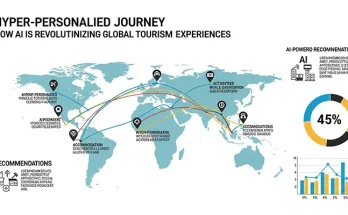The landscape of work and travel has undergone a seismic shift in recent years, with remote work and ‘bleisure’ travel becoming prominent trends in the global business arena. As businesses adapt to the demands of a remote workforce and travelers seek to blend work with leisure experiences, new challenges and opportunities have emerged for companies operating in this dynamic space. In this article, we explore the hurdles to overcome and the prospects to exploit for remote work and ‘bleisure’ travel businesses on a global scale.
Challenges Facing Remote Work Businesses:
- Connectivity Issues: Inconsistent internet connectivity in remote locations can hamper productivity for remote workers and complicate the operations of remote work businesses.
- Communication Barriers: Effective communication among digital teams spread across different time zones and cultural backgrounds can present challenges that impede collaboration and workflow.
- Security Concerns: Safeguarding sensitive data and ensuring cybersecurity measures are in place to protect remote work systems from potential breaches and cyber threats is a critical challenge.
Opportunities for Remote Work Businesses:
- Global Talent Pool: Remote work allows businesses to tap into a diverse talent pool by recruiting skilled professionals from around the world, transcending geographic boundaries and promoting inclusivity.
- Cost Savings: Transitioning to remote work models can lead to reduced overhead costs related to office spaces, utilities, and infrastructure, boosting the bottom line for businesses.
- Enhanced Work-Life Balance: Remote work fosters a healthier work-life balance for employees, resulting in increased morale, productivity, and retention rates.
Challenges in ‘Bleisure’ Travel:
- Work-Life Balance Concerns: Blending work commitments with leisure activities can blur boundaries and lead to challenges in disconnecting from work while on a ‘bleisure’ trip.
- Travel Logistics: Coordinating travel arrangements, managing schedules, and aligning work priorities with leisure experiences can be complex and demanding for ‘bleisure’ travelers.
- Cultural Adaptation: Navigating different cultural norms, business practices, and social etiquettes in diverse destinations can pose challenges for travelers engaging in ‘bleisure’ trips.
Opportunities in ‘Bleisure’ Travel Businesses:
- Personalized Experiences: Offering tailored itineraries and bespoke services that cater to the unique preferences and interests of ‘bleisure’ travelers can enhance customer satisfaction and loyalty.
- Work-Friendly Accommodations: Providing work-friendly amenities, such as high-speed internet, coworking spaces, and quiet work areas, can attract ‘bleisure’ travelers seeking a seamless blend of work and leisure during their trips.
In the rapidly evolving landscape of remote work and ‘bleisure’ travel, businesses face a multitude of challenges and opportunities that require strategic foresight and adaptation. By addressing connectivity issues, promoting effective communication, and prioritizing cybersecurity in remote work settings, businesses can overcome obstacles and maximize the benefits of a distributed workforce. Similarly, in the realm of ‘bleisure’ travel, opportunities lie in offering personalized experiences, facilitating work-friendly accommodations, and creating seamless itineraries for travelers seeking a perfect blend of work and leisure. By recognizing and capitalizing on these trends, global businesses in remote work and ‘bleisure’ travel can navigate the complexities of the modern work-travel paradigm and thrive in an era of innovation and transformation.





